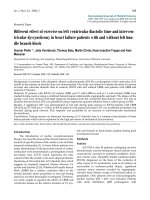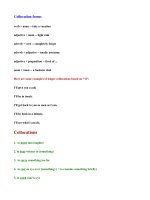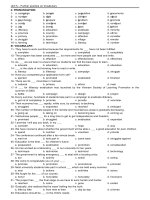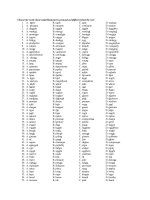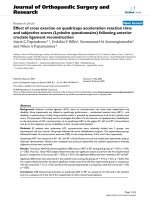EXERCISE ON ADJECTIVES
Bạn đang xem bản rút gọn của tài liệu. Xem và tải ngay bản đầy đủ của tài liệu tại đây (131.58 KB, 6 trang )
PARTS OF SPEECH ADJECITVES
ADJECTIVES
I. ĐỊNH NGHĨA VÀ CẤU TẠO CỦA TÍNH TỪ
1. Định nghĩa tính từ
– Tính từ là từ chỉ tính chất, mức độ, phạm vi, ... của một người hoặc vật. Nó bổ nghĩa cho danh từ, đại
từ hoặc động từ liên kết (linking verb). Tính từ luôn đứng trước danh từ được bổ nghĩa:
That is my new red car.
– Tính từ không thay đổi theo ngôi và số của danh từ mà nó bổ nghĩa, trừ trường hợp của "these" và "those".
– Tính từ có thể kết hợp với “the” để tạo thành danh từ
Ví dụ: The poor : người nghèo
The rich: người giầu
2. Phân loại tính từ
– Tính từ miêu tả (descriptive adj): Tính từ mô tả là các tính từ chỉ màu sắc, kích cỡ, chất lượng của một vật hay
người.
Ví dụ: beautiful, interesting, colorful, red, new, important….
– Tính từ giới hạn (limiting adj): Tính từ giới hạn là tính từ chỉ số lượng, khoảng cách, tính chất sở hữu, ...
Ví dụ:
số đếm: one, two….
số thứ tự: first, second….
tính chất sử hữu: his, your, my….
đại từ chỉ định: this. that, these….
số lượng: much, few, many…..
3. Tính từ tận cùng bằng –ing và –ed
Adjectives of attitude or adjectives ending in ‘ –ing’ or ‘ – ed’ (Các tính từ chỉ thái độ hoặc các tính từ tận
cùng bằng đuôi –Ing hoặc – ed.
Một số động từ khi thêm –Ing hoặc - ed được dùng như một tính từ, chúng có nghĩa tương tự nhưng cách dùng
thì khác nhau. Cụ thể:
* Tính từ ‘ –ing ‘ thường có ý nghĩa “ gây ra” (thường dùng cho vật hoặc sự việc).
* Tính từ ‘ –ed’ thường có ý nghĩa là “bị/ được” (thường dùng cho người).
Ví dụ: - Learning English is interesting.
- Many students are interested in learning English.
Adjectives endind with “Ving”
Structures
S + Be + Ving
S (person) +
Find + O (thing) + Ving
A / An / The +
Ving + Noun
The most +
Ving + Noun
Anything
/
something + Ving
Have a very +
Ving + Noun
Adjectives Fascinating (lôi cuốn)
Exciting (sôi động)
Amusing (vui, hay)
Amazing (kinh ngạc)
Astonishing (kinh ngạc)
Shocking (sửng sốt)
Ms Honey
Adjectives ending with “Ved”
S + Be + Ved +
Prep
S (person) + Make /
feel / look (O) + Ved
S + Get + Ved
S + Be + Adv
(often, always, never, sometimes, usually ) +
Ved
Fascinated (lôi cuốn) + by
Excited (sôi động) + about / at / by
Amused (vui, hay) + at / by
Amazed (kinh ngạc) + at / by
Astonished (kinh ngạc) + at / by
Shocked (sửng sốt) + by
Page 1
PARTS OF SPEECH ADJECITVES
Disgusting (kinh tởm)
Embarrassing (bối rối)
Confusing (bối rối)
Horrifying (kinh hoàng)
Terrifying (kinh khiếp)
Frightening (sợ hãi)
Depressing (nản chí)
Worrying (lo lắng)
Annoying (quấy rầy, làm phiền)
Disgusted (kinh tởm) + at /by / with
Embarrassed (bối rối) + about / at
Confused (bối rối) + about
Horrified (kinh hoàng) + by
Terrified (kinh khiếp) + of/ at
Frightened (sợ hãi) + of
Depressed (nản chí) + about
Worried (lo lắng) + about
Annoyed (quấy rầy, làm phiền) + with (person)
Annoyed (quấy rầy, làm phiền) + at / about
Exhausting (kiệt sức)
(thing)
Satisfying (thỏa mãn)
Exhausted (kiệt sức)
Interesting (thú vị)
Satisfied (thỏa mãn) + with
Boring (chán)
Interested (thú vị) + in
Surprising (ngạc nhiên)
Bored (chán) + with
Tiring (mệt mỏi)
Surprised (ngạc nhiên) + at / by
Disappointing (thất vọng)
Tired (mệt mỏi) + of
Disappointed (thất vọng) + at / by sth
Frustrating (thất vọng)
Disappointed (thất vọng) + in / with sth / sb
Irritating (kích thích, chọc tức)
Frustrated (thất vọng) + at / with
Irritated (kích thích, chọc tức) + at/ by /with
Examples
1. The film is interesting.
1. I am interested in football.
2. I find the radio boring.
2. You make her surprised.
3. It is an amusing game.
3. I am never exhausted.
4. The most interesting book is Harry
4. I feel bored.
Porter.
5. He has a very annoying dog.
II. VỊ TRÍ VÀ CHỨC NĂNG CỦA TÍNH TỪ
Tính từ có thể làm tính từ (attributive use) hoặc bổ ngữ (predicate use).
1. Làm tính từ:
– Khi làm tính từ, tính từ tiếng Anh thường đứng trước danh từ.
Ví dụ: It is a hot day.This is a new car. Nam will become a good worker.
– Những trường hợp đặc biệt:
+ Đứng sau một nhóm từ ngụ ý đo lường :A river two hundred kilometers long A man eighty years old
+ Đứng sau everything, anything, something, nothing ; I’ll tell you something new ,There is nothing new.
+ Đứng sau danh từ khi cần một nhóm từ bổ nghĩa cho nó He wants a glass full of milk.
+ Trong trường hợp nhiều tính từ cùng bổ nghĩa cho một danh từ, có thể đặt sau
He has a face thin and worn, but eager and resolute.
2. Làm bổ ngữ
– Tính từ làm bổ ngữ khi nó kết hợp với một động từ làm thành vị ngữ trong câu. Các động từ trước nó thường
là “to be, to turn, to become, to fall, to keep, to remain…”
Ví dụ: It is cold, wet and windy. Nam fell asleep.
– Nó cũng có thể đi theo sau cả động từ và tân ngữ để làm bổ ngữ cho tân ngữ.
Ví dụ: The sun keeps us warm.
This doesn’t make me happy.
Chú ý: Hấu hết các tính từ có thể dùng được ở cả hai chức năng trên. Chỉ có một số động từ chỉ dùng làm
bổ ngữ sau: alive, afraid, ashamed, aware, asleep, awake, alone.
III. QUI TẮC CẤU TẠO TÍNH TỪ
1. Tính từ đơn
• Noun + y
Ví dụ: rain + y –> rainy
wind + y –> windy
sun + y –> sunny
• Noun + ly
Ví dụ: day + ly –> daily
man + ly –> manly
Ms Honey
Page 2
PARTS OF SPEECH ADJECITVES
• Noun + ful
Ví dụ: care + ful –> careful
beauty + ful –> beautiful
• Noun + less
Ví dụ: care + less –> careless
home + less –> homeless
• Noun + en
Ví dụ: gold + en –> golden
wool + en –> woolen
• Noun + some
Ví dụ: trouble + some –> troublesome
quarrel + some –> quarrelsome
• Noun/adjective + ish Ví dụ: book + ish –> bookish
white + ish –> whitish
girl + ish –> girlish
• Noun + ous
Ví dụ: humour –> humourous
danger –> dangerous
2. Tính từ ghép
• Adjective + adjective
Ví dụ: a dark-blue coat, a red-hot iron bar
• Noun + adjective
Ví dụ: snow-white cotton, the oil-rich Middle East
• Noun + participle
Ví dụ: a horse-drawn cart, a heart-breaking story
• Adjective + participle Ví dụ: ready-made clothes, a good-looking boy
• Adverb + participle Ví dụ: a newly-built house, an ill-smelling odour
• Noun + noun-ed
Ví dụ: a tile-roofed house
• Adjective + noun-ed Ví dụ: a dark-haired girl
• A group of words
Ví dụ: a twenty- year- old girl, an eight-day trip, an air-to-air missile
Bài tập:
I. Đặt tính từ trong ngoặc vào đúng vị trí
1. Bring me something to drink (cool)
2. The leaves turn in Autumn (yellow)
3. Woollen clothes keep our bodies (warm)
4. Shelly is a poet (famous)
5. I have nothing to give you (interesting)
6. The corn waved in the wind (ripe, golden)
7. Vietnam is a country (rich and beautiful)
8. I found him still in his bed (asleep)
9. Aren’t these oranges (delicious)?
10. Is she a girl (pretty)?
I’m quite ex………………about it.
II. Hoàn thành các câu sau bằng tính từ đuôi ing hoặc ed. Chữ đầu tiên của tính từ đã được cho sẵn.
1. I seldom visit art galleries. I’m not very in…………………in art.
2. We went for a very long walk. It was very ti…………
3. Why do you always look so b………….? Is your life really so b……?
4. He is one of the most b…………people I’ve ever met. He never stops talking and never says anything
in…………
III. Tìm những tính từ tương ứng với các từ dưới đây:
Beauty, man, woman, girl, gold, cheer, care, week, month, sun, rain, fog, cloud, help, brave, wonder, pain,
wood, storm, boy.
IV: Thay thế bằng tính từ ghép
1. A house with yellow walls.
2. A dress of the same blue as the sky
3. A man in a black coat
4. Flowers which smell sweet.
5. A plough drawn by an oxen.
6. A country which produces tea
7. A face as white as the moon.
8. A girl whose hair is long.
V. Comeplete the sentences with the suitable “-ed”, “-ing” form of the words in brackets.
1. The book I’m reading is really _______.
(Interest)
2. I’m really ______ in reading this book.
(Interest)
3. The girl was ______ about her coming birthday party.
(Excite)
Ms Honey
Page 3
PARTS OF SPEECH ADJECITVES
4. The match we saw on TV last night was very ______.
(Excite)
5. The story I just finished had a very ______ ending.
(Surprise)
6. I was really ______ by the ending of the story.
(Surprise)
7. The characters in the story are _______ .
(Fascinate)
8. The child is really ______ by the characters in the story.
(Facsinate)
9. I’m _______ . I can’t understand the instructions on this box.
(Confuse)
10. The instructions on the box are _____ .
(Confuse)
II. Complete the sentences by using adjectives ending with “ed or ing”:
1. You are really _________ (excite) about the fairy tale.
2. She is often ________ (annoy) when returning home.
3. The music programmes are _______________ (bore).
4. I found your present __________________ (interest).
5. They made me _____________ (shock).
6. Computer is a __________ (fascinate) invention.
7. I felt ___________________ (disappoint).
8. The most __________________ (terrify) memory in my mind was an accident.
9. There is something ____________ (move) in my shirt.
10. Tom is ____________ (irritate) by the crowds.
11. This football match is ________________ (bore).
12. I am ______________ (tire) of running fast.
13. She isn’t often ____________ (sastisfy) with her life.
14. The most _________________ (horrify) memory in my mind is falling down the mountain.
15. The test makes Mai ________________ (worry).
16. Your party is _________________ (depress).
17. They have a very _____________ (excite) party.
18. The man finds the “Titanic” film _________ (amuse).
19. She feels __________________ (confuse).
20. Your appearance made me _____________ (surprise) last night.
21. Dying is a _________________ (terrify) accident.
22. You are _______________ (embarrass) about your behavior.
23. At the end of the day, I am usually ________ (exhaust).
24. They felt _________ (frustrate) at the lack of progress.
25. The evil face makes the baby ___________ (frighten).
26. His bad behavior is very ______________ (disgust).
27. We were all _______ (shock) at the news of his death.
28. An _______________ (amaze) discovery is fire.
29. My parents looked __________________ (astonish) at my news.
30. This drug is _____________ (irritate).
Bài tập 1: Chọn đáp án đúng
1. We were all (horrifying/horrified) when we heard about the disaster.
2. It’s sometimes (embarrassing/embarrassed) when you have to ask people for money.
3. Are you (interesting/interested) in football?
4. I enjoyed the football match. It was quite (exciting/excited).
5. It was a really (terrifying/terrified) experience. Afterwards everybody was very (shocking/shocked).
6. I had never expected to be offered the job. I was really (amazing/amazed) when I was offered it.
7. The kitchen hadn’t been cleaned for ages. It was really (disgusting/ disgusted).
8. Do you easily get (embarrassing/embarrassed)?
Ms Honey
Page 4
PARTS OF SPEECH ADJECITVES
I. Bài 1:
1. horrified
2. embarrassing
3. interested
4. exciting
5. terrifying
6. amazed
7. disgusting
8. get embarrassed
Bài 2:
1. interested
2. tiring
3. bored, boring
4. boring, interesting
5. excited
1. Bring me something cool to drink
2. The leaves turn yellow in Autumn.
3. Woollen clothes keep our bodies warm.
4. Shelly is a famous poet.
5. I have nothing interesting to give you.
6. The golden ripe corn waved in the wind.
7. Vietnam is a rich and beautiful country.
8. I found him still asleep in his bed.
9. Aren’t these oranges delicious?
10. Is she a pretty girl?
II. Bài 1:
beauty –> beautiful
man –> manly
woman –> womanly
girl –> girlish
gold –> golden
cheer –> cheerful
care –> careful
week –> weekly
month –> monthly
sun –> sunny
rain –> rainy
fog –> foggy
cloud –> cloudy
help –> helpful
brave –> bravery
wonder –> wonderful
pain –> painful
Ms Honey
Page 5
PARTS OF SPEECH ADJECITVES
wood –> wooden
storm –> stormy
boy –> boyish
Bài 2:
1. A house with yellow walls = a yellow-walled house
2. A dress of the same blue as the sky = a blue sky dress
3. A man in a black coat = a black-coated man
4. Flowers which smell sweet = sweet-smelling flowers
5. A plough drawn by an oxen = an oxen drawn plough
6. A country which produces tea = a tea-producing country
7. A face as white as the moon = a moon-white face
8. A girl whose hair is long = a long haired girl
III. Bài 1:
1. Her daughter is as beautiful as her.
2. Summer is the hottest season of the year.
3. That dog isn’t as dangerous as it looks.
4. In the past, people were more polite than today.
5. It is colder today than it was yesterday.
6. Our hotel was cheaper than all the others in the town.
7. What’s the longest river in the world.
8. It was an awful day. It was the worst day of my life.
9. Everest is the highest mountain in the world. It is higher than any other mountain.
10. I prefer this chair to the other one. It’s more comfortable.
Bài 2:
1. This is the most delicious cake I’ve ever tasted.
–> I’ve never tasted a more delicious cake than this one.
2. I’ve never met any more dependable person than George.
–> George is the most dependable person I’ve ever met.
3. There isn’t anybody as kind-hearted as your mother.
–> Your mother is more kind-hearted than anyone.
4. There is no better teacher in this school than Mr John.
–> Mr John is the best teacher in this school.
5. Have you got any bigger hat than that one?
–> Is this the smallest hat you’ve got?
IV. Đáp án:
1. Aunt Betty wants a square gray stone coffee table.
2. The king took an exhausting 2-week trip.
3. These are delicious huge chocolate chip cookies!
4. Alice prefers black Italian leather furniture.
5. Archeologists get very excited when they find large prehistoric animal bones.
Ms Honey
Page 6
